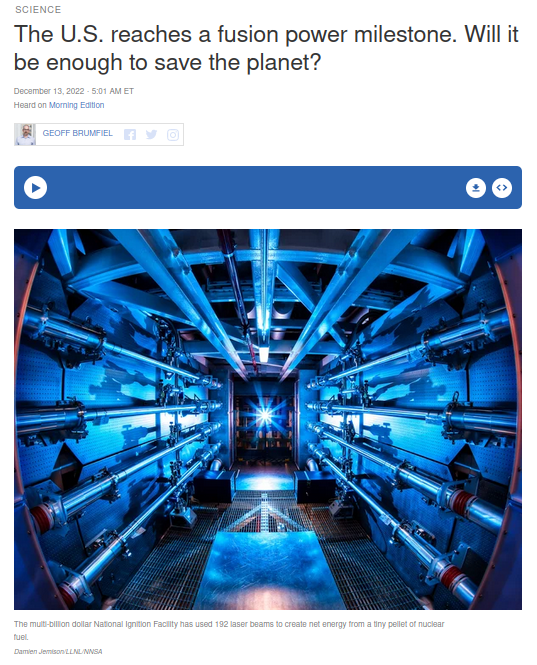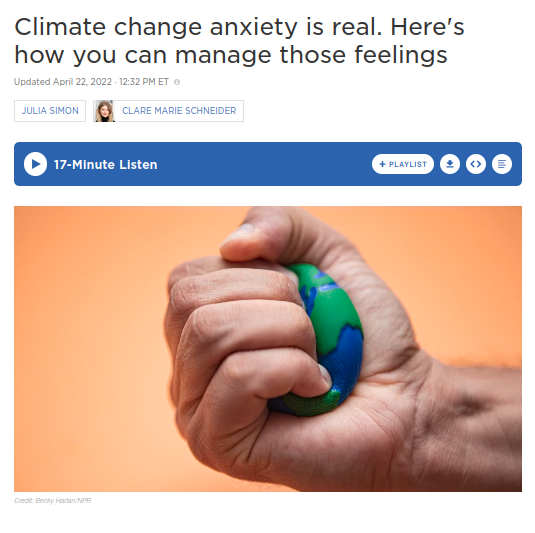This is the original Technological Antisolutions post. There is now an much longer, more detailed version of this post, which can be found here.
As I write this, physicists at the Lawrence Livermore National Laboratory have announced that a tiny pellet of hydrogen fuel in a fusion reactor has released more energy than the lab’s lasers have put in. NPR has chosen to cover this achievement like this:

NPR has covered several science and technology stories this way, from nuclear fusion to carbon removal to even chocolate and breakfast cereals.
In fact, when searching npr.org for the phrase “save the planet," one comes across two kinds of stories. The first offers a dizzying array of products of all shapes and sizes that are going to save us from climate change. The second looks like this:

The message is clear – NPR expects its readers to be passive consumers of climate change solutions. We are asked to marvel at the shiny innovations brought to us by our technological superiors, and while we wait for them to solve climate change for us, we are given strategies to cope with the stress. Climate Change is thus transformed – or perhaps reduced – from a political problem to a technological one.
I have written before on why I think tech solutions to climate change are a con. It is a political problem that we know how to solve, and yet NPR is clearly waiting with bated breath for that tech that will finally save us. I propose we name these kinds of technology Technological Antisolutions.
A Technological Antisolution is a product that attempts to replace boring but solvable political or social problems with a much sexier technological one that probably won’t work. This does not mean that we should stop doing R&D. Much like the fusion example, a technology that is worth pursuing can become a technological antisolution depending on its social and political context. The physicists have done nothing wrong and should be congratulated on their achievement; NPR, on the other hand, has devalued their work by placing it in an inappropriate context.
Technological Antisolutions are everywhere because they allow us to continue living an untenable status quo. Their true product is not the technology itself, but the outsourcing of our social problems. They alleviate our anxiety and guilt about not being active participants in political change, and for their trouble, founders and investors are richly rewarded.
In fact, most of the world’s richest man’s wealth has come from precisely this phenomenon. Investors and analysts have long puzzled over the wildly inflated valuations of his companies, noting that Tesla’s market cap has oftentimes exceeded the combined market cap of its five major competitors. It is because Elon Musk does not sell cars, or spaceships, or tunnelling equipment; he sells political apathy. He tells us he can solve our social problems by replacing them with cool sounding technology that he will never be able to deliver.
There is perhaps no better example of technological antisolution than the self-driving car. American transit is a political crisis on so many levels. The average American’s daily routine involves spending an inordinate amount of their day operating 4,000 lbs of heavy machinery that burns fossil fuels. Oftentimes, these machines capable of cruising safely at 70+mph are forced to sit in queues miles long because there are so many of them. This twice-daily society-wide masochistic ritual destroys the air quality in our cities, the psychological well-being of its participants, the physical spaces we inhabit, and the only wet rock capable of sustaining human life in an otherwise cold and unwelcoming universe.
We all instinctively know this is madness, and into this breach steps the self-driving car industry. They offer to leave our lives and our cities completely intact. They offer the status quo, but perfected. They offer convenience in exchange for political apathy and patience. Perhaps NPR can give you some tips on how to deal with your traffic-anxiety while you wait for self-driving cars.
Self-driving cars in which you sit in a personally owned consumer vehicle with no steering mechanisms and continue your life as before are a lie. They are not coming. The great Cory Doctorow has articulated the skepticism that so many of us feel, so I will quote him:
Using “deep learning" to solve the problems of self-driving cars is a dead-end. As NYU psych prof Gary Marcus told Chafkin, “deep learning is something similar to memorization…It only works if the situations are sufficiently akin."
Which is why self-driving cars are so useless when they come up against something unexpected — human drivers weaving through traffic, cyclists, an eagle, a drone, a low-flying plane, a deer, even some pigeons on the road.
Self-driving car huxters call this “the pogo-stick problem" — as in “you never can tell when someone will try to cross the road on a pogo-stick." They propose coming up with strict rules for humans to make life easier for robots.
That line there at the end is the game. Self-driving cars are just worse trains, as evidenced by the time Musk had to actually attempt to deploy his vision, or lack thereof. These cars will require physically modifying the environment to make some sort of... let’s call it a “track." Had we spent those $100 billion dollars on a massive overhaul of American public transit, we could have already built the infrastructure we need to solve this crisis. Instead, we have made a few tech entrepreneurs very rich, and we are left with the same political problem as before.
Self-driving cars are not even the only example of a technological antisolution within Musk's own companies. SpaceX promises perhaps the dumbest solution to climate change possible: colonizing space. Elon Musk has convinced legions of people that it will be easier (or maybe better? more desirable?) to colonize Mars to save humanity than to avoid destroying the only planet where food literally grows on trees and water falls from the sky.

There are food startups like Farm Pod that promise to deliver "equitable access to healthy, nutritious and delicious food produced in an environmentally friendly manner" by selling autonomous aquaponic "pods" to urban food deserts. Better Help is monetizing access to mental health services in a collapsed healthcare system. There is even BanQu, a blockchain company that attempts to track every interaction anywhere on any supply chain in order to add transparency to the exploitation in global capitalist supply chains.
Continuously wishing for tech to solve our social problems is a sign of a stagnating society. We can barely maintain the infrastructure that previous generations actually had to go out and build, much less imagine a world where we expand it. It is unthinkable to the average American living in Manchester, NH or Columbus, OH that the town would break ground on a new subway system. In the few cities old enough to have a subway, even upgrading the rolling stock when the existing cars are past their end of service date feels like an incredible hurdle to overcome. As our society becomes increasingly unable to fathom tackling its complex political problems, more companies offering technological antisolutions will step in to monetize our inaction and discontent. They are vultures feeding off the corpse of our decaying world.

